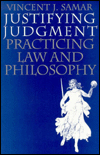

 |

|

The average rating for Justifying judgment based on 1 review is 3 stars.
Review # 1 was written on 2018-01-04 00:00:00 Rich Wynbeek Rich WynbeekI was amazed to find so much relevance in a book on Internet published twenty years ago in 2000, before social networks were launched (Facebook was launched in 2004), two years after Google launched it search engines and eons before the Cambridge Analytica scandals. It is true that ethical issues tend to be long lived, but the book’s relevance owes a great deal to the expertise and farsightedness of many of the book’s contributors. This pleasant surprise is what jogged my elbow into giving the book four stars instead of a perfectly valid and defensible three star rating. The chapter I most enjoyed is Deborah G. Johnson’s “Democratic Values and the Internet” (chapter 8). Although it is becoming harder and harder to believe that Internet technology inherently enhances democracy, I remember the tremendous rush of excitement generated by this idea -and this well before the Arab Spring, which essentially shifted the idea to social media. Johnson’s analysis is still relevant and certainly worth reading. Her conclusion was that the Internet is not biased towards democratic values or principle, as we have ruefully learnt in more recet years. What makes the chapter worth reading is her careful analysis of arguments purporting to find democratic values infused in the Internet. John Weckert’s “What is New or Unique about Internet Activities” is another prescient chapter and covers topics such as the digital divide, intolerance, cultural imperialism, the plus and minus aspects of Internet anonymity, filter bubbles, possible exploitation of those working from home, and trust. Joroen van den Hoven’s chapter 6, “The Internet and Varieties of Moral Wrongdoings” is a bit more confusing but includes an important number of key insights, particularly on the relation between choice and information, the shortcomings of attempting to mechanically apply ethical theories to Internet quandaries, the distinctions between Internet-related, Internet-dependent, Internet-determined and Internet-specific moral issues, responsibility and the (possible lack of) reliability of information on the Internet. Two chapters deal with privacy, Herbert Tavani’s “Privacy and Security” and Donald Gotterbarn’s “Virtual Information and the Software Engineering Code of Ethics”. Tavani provides a nice conceptual analysis that distinguishes between the condition of privacy, the right to privacy , the loss of privacy and violation of privacy which allows him to explain the differences, advantages and shortcomings of four different privacy theories: Non-intrusion theory, Seclusion theory, Limitation theory and Contro theory. .He looks in the ethics surrounding the use of “cookies”, some privacy enhancing tools of the time, and some outdated privacy legislation. Gotterbarn’s chapter is about the possible use and distinctions between codes of ethics, codes of professional conduct and codes of practice, but the most interesting parts of the chapter are on privacy. John Mawhood and Daniel Tysver a chapter on “Law and the Internet” which focuses on copyrights and patents, liability, copyright infringement and defamation. The section on patents is historically interesting since software patents had rewcently been allowed -a historical decision well worth revisiting. The chapter compares the US and the UK legislation on a number of interesting and important aspects. Some chapters, such as the overview on Internet technology is dated as is the decision to include a (weak) chapter on security (“Information Integrity”) -nowadays security/safety issues, ethical issues and legal issues have grown so much it is hard to remember that once upon a time they all fitted comfortably in a course and between the covers of a slim book -and the amount of space devoted to neteiquette strikes me as quaint. One of the best features of this US-centered book are the enriching comments provided by a number of specialist authorities from countries like Hong Kong, Norway, Sweden, Singapore, Japan, Russia, Brazil, Botswana and Australia which provide broader and more multicultural views of important issues. I would not recommend this book in 2020+ as introductory reading to undergraduates, graduates or professionals. However it makes for interesting reading for those with some appreciation for history, and will surprise many readers with some still timely analyses and arguments. Personally, I would love to see a 2020 update to this book! |
CAN'T FIND WHAT YOU'RE LOOKING FOR? CLICK HERE!!!